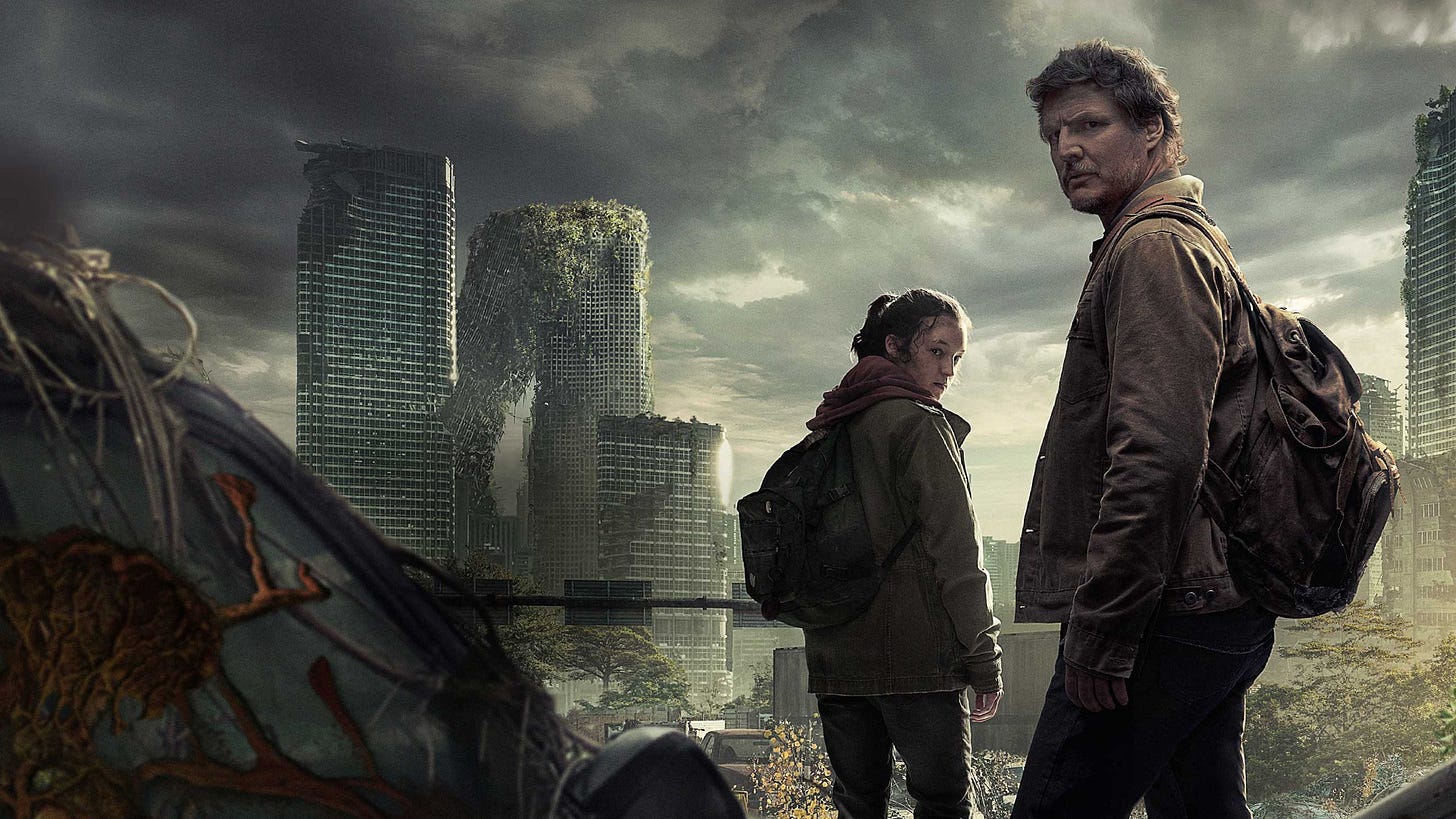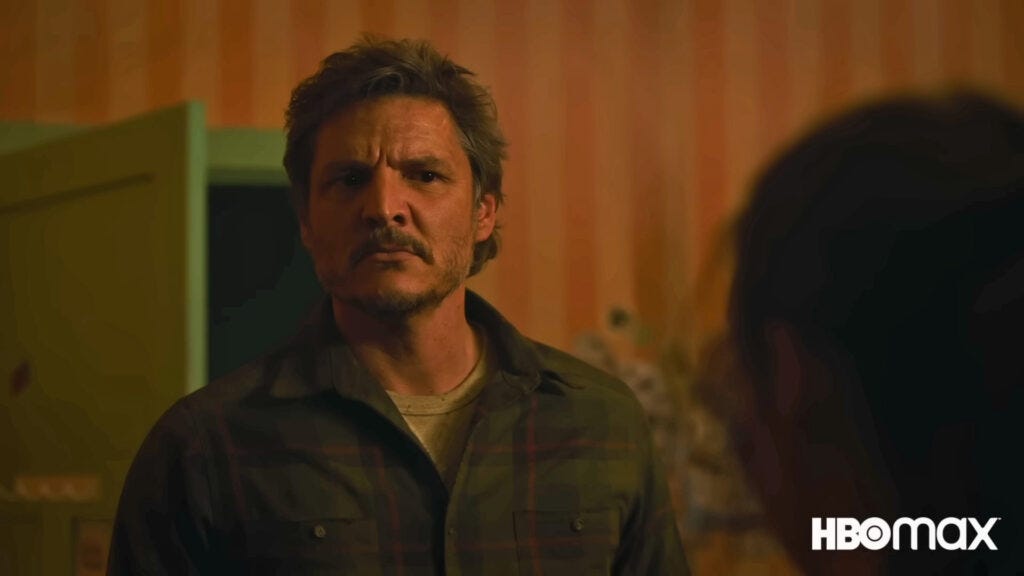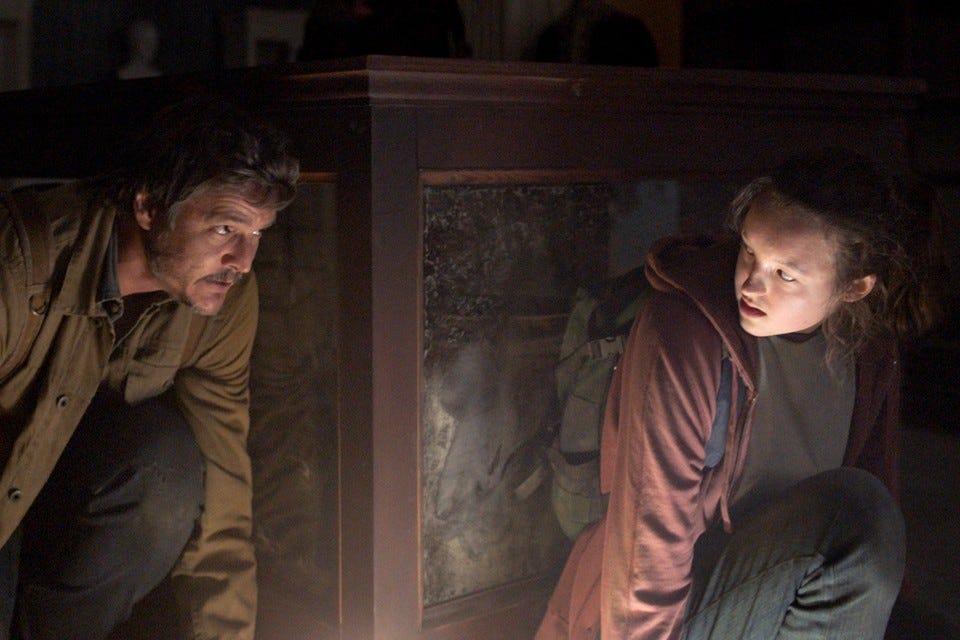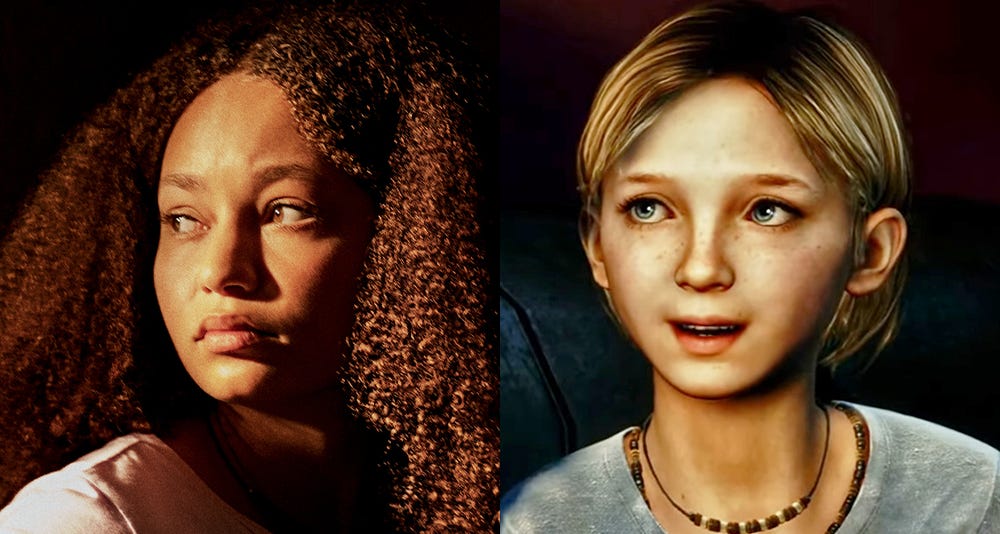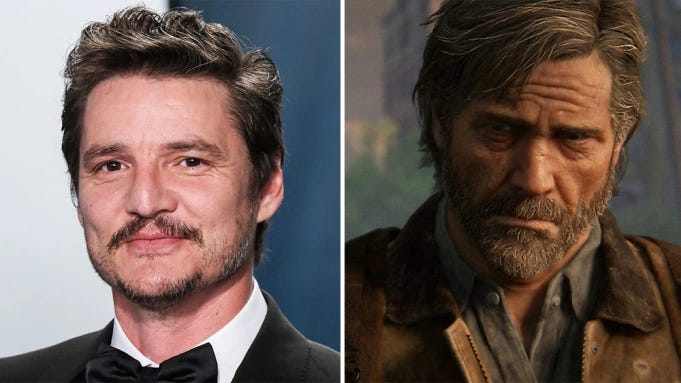The Last of Us Episode 1: A Boring, Pointless Adaptation
Let's face it: I was never going to like this show. But I'm duty-bound to watch it anyway.
In the two weeks since I posted my review of The Last of Us' PS5 remake, a particular fear has overcome me. What if, as USA Today claims, The Last of Us on HBO turns out to be "the best video game adaptation ever?" Would I look a fool? Would my dire predictions for the show come to naught? Would I be summarily humiliated for doubting what can only be described as a masterpiece of television?
"Best video game adaptation ever" is a low bar, it must be said. But all the same it became increasingly possible--even probable--that this new adaptation, headed by Neil Druckmann himself, would not only be decent...but maybe, even, good.
Don't take this to mean that I wanted to dislike The Last of Us on HBO. Indeed as positive reviews flooded the internet I began to think: if only I could feel the same way as a corporate journalist does while watching this show! I have had few aspirations in my life beyond this. The original game on PS3 is one of those few unifiers in media: a beacon of quality universally beloved by almost everyone who plays it. Even Yahtzee had to admit it was okay. It's one of the few properties that enjoys ultra-mainstream levels of critical acclaim and also entirely deserves every ounce of its success. Even I adore it, and I don't like anything.
Is this TV adaptation the same? Does it live up to the hype? Will it unify audiences from The Federalist to Kotaku, from gamers to grandparents, from fans to strangers alike?
It's too early to tell. Unlike the critics I am not privileged to watch all nine episodes before writing my reviews. But what I can report is that its first episode is over-long, poorly paced, and utterly pointless.
Utterly Pointless
Consider your favorite novel. In it bullets fly left and right. The protagonist traverses epic set pieces. There's drama and psychological strain at every turn. You feel as though you know the main characters. You can hear their voices in your head. You can almost see the events as they're described.
But forever will you be relegated to almost. A novel might be as good as a film, as compelling and engaging, but you will never, truly see what's in your mind, and you will never be able to show it to others--as you could with a film.
This is the justification for adaptations from prose to screen. Everything about the presentation of the story changes with the alteration of medium. The story remains while the content is transformed into something different--something awesome--something you can see. And while it probably won't ever be as amazing as the original book, it'll at least be interesting. At least you'll see clearly, in realized detail, what you weren't able to see before. At least you'll be able to put a face to the characters and a color palette to the world. At least you'll get a sense of what others experience when they read that same book.
Now consider the various formal qualities of The Last of Us on PS3. I'll list them for convenience. It has:
A story
Dramatically blocked cutscenes, complete with cinematography and lighting design
Voice acting
A strong visual component and thoroughly realized world
Sound design
Music
15-20 hour playtime
All the elements of gameplay
Contrast this with the various formal qualities of The Last of Us on HBO. It has:
A story
Dramatically blocked scenes, complete with cinematography and lighting design
Voice acting
A strong visual component and thoroughly realized world
Sound design
Music
10-15 hour runtime
The adaptation of a novel into cinema changes the form entirely. There are no visuals in prose except those alive in your mind. It is a completely different medium. But from video game to TV show?
I hope the above does something to bring my point across, before I need say it: what is the difference between TV and gaming? Gameplay. Everything else is the same. They use the exact same tools to tell a story, save one.
Gameplay is a very powerful storytelling device. It is a huge boon to games like The Last of Us, which wield it so effectively to build empathy, develop character, and pace story.
A TV show on HBO lacks gameplay. Yet it adds nothing of its own to compensate. Visuals? Character? Acting? Music? No, those elements were already present. In fact I would and often have argued that even from scene-to-scene the TV show is at a disadvantage, because it's much easier to cast the exact right people and get the exact right performances when no concern need be paid to the physical demands of locations, lighting, set design, etc.
This above all other reasons is why the acting in Naughty Dog games is so spectacular. It wouldn't ever be as good in live action.
So what's the point? What reason is there to adapt this game into that TV show? What's added?
Nothing. Nothing, except the removal of gameplay. That might sound great to you if you don't play video games; for those of us who do, the transition between PlayStation and streaming is completely without any purpose. A novelization might have been interesting, but TV adds nothing to the formula--at least in a game as strongly narratively-driven as those developed by Naughty Dog.
That's why I say The Last of Us on HBO is pointless.
Utterly Boring
Be all that as it may, pointlessness does not connote any lack of quality. It may yet be the case that, however ill-conceived the adaptation in the first place, The Last of Us starring Pedro Pascal and Bella Ramsey will be excellent. And if it is, then it's some way to show the story I love so much to my family, or any other friends, who don't and won't play games.
Worse for me. Better for them. Right?
It should be noted that, as someone who beats the first game two or three times every year, I cannot reasonably be expected to give this show a fair shake. I have preconceptions about the story, the world, and the characters that I expect to be affirmed. I tried at first to set this aside and enjoy the show for what it is, but I can't. It's not possible.
If it's any counterpoint to what follows, I watched this first episode with my elderly, non-gamer parents; they both thought it was adequate, if slow. Consider that my disclaimer as I continue.
The World
Basically everyone will notice the change in timeframe. While the first game started in 2013, this TV adaptation starts in 2003. Why? Maybe to make Joel closer in age to Pedro Pascal; maybe for the 'gotcha' factor of having the far-future apocalypse take place in 2023; or maybe because the Fireflies are supposed to be the good guys, FEDRA the bad guys, and the Neanderthals at HBO found it easier to justify this dynamic if 'the government' was headed by George W. Bush instead of Barrack Hussein Obama.
This is a minor change to the setting overall. But it raises questions about the characters and their histories that were not necessary.
Other changes are equally confounding but more offensive. The first infected we meet is an old lady in a wheelchair. Upon 'turning,' the cordyceps in her brain apparently imbues her with such strength that she maims and nearly kills both of her caretakers.
You know, like a zombie.
Not being deterred by having their throats ripped out, these two caretakers, at first seen alive and bleeding to death, soon return from the dead themselves. They then stumble out into the street after Joel and his family.
I hope I don't need to spend time explaining why this is so fucking wrong. I've done it once already. 'Zombies' in The Last of Us are not zombies. They are human beings infected with cordyceps fungus. They do not raise from the dead. They do not come back to life. They needn't be shot in the head. If an old lady with brittle bones is infected with cordyceps and comes after you, she should be trivially defeated. As if you were fighting any normal crazy, weak, osteoperosized, wheelchair-bound grandmother. (Trust me, I've encountered a few in my time; they're never hard to overcome.)
Not so in this new TV adaptation. Not only are the infected now imbued with zombie strength, they twitch and fidget, blood pouring from their mouths, eating flesh, while waiting for hapless survivors to stumble by their charnel pits.
Those unfamiliar with the games could be forgiven if they thought these were the same zombies as in any other cheap Walking Dead knock-off.
That the infected are simply another lifeform, with their own right to exist, who are biological and not necromantic, is one of the most important thematic points of the original game. The molestation of this theme in Part II is one among many, many, many reasons why that game is utter shit.
This does not bode well for this TV series.

As for the production design more broadly, it's certainly recognizable as The Last of Us (as a franchise). The Boston QZ looks more or less like it does in the first game. The city beyond the walls is bombed out, as should be expected. At night especially, at the episode's end, it looks just like the first real gameplay environment in The Last of Us.
Yet something is rotten. I don't know what it is. I can't put my finger on it. It has to do with depth-of-field and eye-melting color saturation. The world looks wrong. It looks fake. The houses don't look like the houses in the game, but like knocked-together sets merely dressed to be apocalyptic. The rooms are too small. The rain too anemic. The people we meet on the street seem more like Hunger Games extras than survivors of a zombie dystopia. The world of the game is effortlessly engrossing; here, I spent the 85-minute runtime wondering why the apocalypse looks so cheap.
The Story
Any adaptation of The Last of Us was going to be forced to grapple with the fact that the game's first act is very messy. There are Swiss cheese-levels of plot holes and conveniences involved in getting Joel and Ellie together. Yet these issues are minor in and of themselves. In a game they hardly matter.
But a TV show isn't a game. It has nothing but story. Therefore its story must be changed.
I don't have much to say on the 2003 portion of the episode, beyond what will be discussed below re: characters. Beyond the change of timeline, I thought the small things that don't make sense--why does Tommy drive into a crowded street? Why do they get hit by another car in such a weird way?--were adequately rectified.
The same cannot be said of the rest of the episode. "20 Years Later," as the chapter is called in the game, is a boring plane crash, like being diverted to three different airports, forced to wait on the ground for five hours, then spontaneously combusting during disembarkment. While it successfully paves over some of the more obvious conveniences, it introduces new ones--and hideously prolongs the runtime.
The most notable thing about this version of The Last of Us relative to the game is that the story is no longer told from Joel's point of view. We see Ellie multiple times before her introduction. We meet Marlene. We watch Tess' adventures.
The primary effect of disregarding subjectivity is that we aren't given enough time to know, learn, or care about any of the characters in detail--most importantly Joel. The lack of a singular narrator is a complete disruption of the structure of the narrative from the game. But that aside, familiar as I am with The Last of Us, I saw nothing over the course of this episode's second act except changes made to close minor plot holes
In the first game, this is what we play through:
Tess and Joel hunt Robert down because he's stolen their guns, or something. It doesn't matter, makes minimal sense, and serves no purpose except to get Joel and Marlene together as quickly as possible. Marlene has been injured during the recent crackdown on Fireflies; she bumps into Joel somewhat coincidentally at Robert's, but realizes soon enough that Joel is just the person she needs to help her smuggle Ellie out of the city--she can no longer do it herself due to her injures. She takes Joel to Ellie and the two are introduced. The game starts in earnest.
Contrived, yes. Full of coincidences, yes. Still good enough for a TV show? Maybe. I honestly don't know.
In the series, this is what we watch (take a deep breath...):
Robert steals a car battery from Joel, that Joel has been trying to get into his truck, because he wants to head to Wyoming in search of Tommy (for a heretofore unexplained reason). Tess is jumped by Robert's men and captured, but actually he only wants to tell her that he doesn't want to fuck with them, because he's afraid of Joel--even though he's clearly already fucked majorly with Joel by stealing his battery. The Fireflies engage in combat with FEDRA soldiers and Tess is taken prisoner, again, but she's then let free without any further conflict. She and Joel then hunt for Robert, looking to get their battery back, but when they get there they find that Robert and all of his men have been slaughtered brutally by Marlene--there were no prisoners taken. Meanwhile, while all of this has been happening, Ellie, a girl we know nothing about, has been chained up in a room at the Firefly HQ. Back at Robert's, it turns out this same girl Ellie is also there. For completely confounding reasons Marlene decides that this random smuggler, with whom she has no established relationship, should actually take Ellie from the QZ instead. Any references to Tommy being a Firefly are subtle, passing, and not nearly as pronounced as in the game ("His brother was a Firefly; told me I could rely on him if I were ever in trouble." Yeah, that line? It's not in the show.).
This massive expansion of the time spent in Boston beyond Joel's PoV resolves two problems:
One: What the fuck is it Robert actually took from Joel and Tess? Why is it important?
Two: How does Joel find Tommy later on in the story? In the game it's a coincidence (although not an especially improbable one). Here, time is spent in the first episode setting up where he'll later find his brother.
I would say the third was explaining and justifying the coincidence of Marlene's presence at Robert's at just exactly the same time Joel and Tess get there, but in fact this is still a coincidence.
I can tell these small issues with the first game were things that always bothered Druckmann. They bothered him, so he set out to fix them. But there's a reason why these details aren't dwelled on extensively in the game...
Because THEY'RE BORING AND DON'T MATTER.
This first episode is duller than Ellie's switchblade after twenty years in the rain. It's contrived and full of characters we have no reason to care about. The introduction of multiple PoVs muddies the narrative and makes the audience's brains hurt. We didn't need any of this new shit; it gets in the way of the plot. It's all so fucking boring. Some changes could have been good, but focus is put in the wrong places. The characters, which are all that really matter, are not adequately developed.
The Characters
The most surprising thing about The Last of Us on HBO is that the quality of the dialogue is poor. Early on, while Sarah is at school, hear a teacher say, "I swear you will need this later in life!" with all sincerity. While waiting for Joel and Tess to decide whether or not to agree to transporting Ellie, Marlene says something to the effect of, "Please take your time, I'm only bleeding to death over here!" The interactions with various 'NPCs' feel like nothing more than just that. What is there to that random guy Joel gives narcotics to? His dialogue sounds like any of the contextual characters you might interact with in the game; shallow, without personality, mostly uninteresting.
In a game we accept this. We understand, intuitively, the PC vs. NPC distinction. One would hope such small storytelling flaws would be resolved during the transition to a medium of pure visual storytelling.
Alas not.
Across the board the dialogue is less naturalistic than in the game. Countless lines have been changed to be more on the nose and less realistic. Joel has cannibalized Tess' dialogue word-for-word, bizarrely, probably because Tess isn't in enough of this episode for us to care about her.
This is one among many reasons why Joel no longer feels like Joel. And neither does Tess, nor Ellie, nor, surprisingly, Marlene, who looks and sounds exactly like Marlene...because she is Marlene. But she doesn't feel like the same character, because the style and content of the dialogue has been substantively changed, and the performances no longer feel like the same characters.
To begin with: Sarah. She's now a black teenager, definitely older than 12, strong and independent. I'm so over this tokenization bullshit, but whatever. It doesn't really matter if the actress is right.
And she's fine. But when Outbreak Day comes, contrast these two performances in your memory.
Sarah spends the entirety of her time in the first game paralyzed in fear: she has no agency, and that lack of agency is transferred onto you as a player through the process of gameplay mechanization. When she wakes up and can't find Joel, she's scared. When she finds his phone buzzing with messages from Tommy, she's terrified. When her father kills the next-door neighbor, she's catatonic. She gets thrown into the back seat of a car and can do nothing. She cries and withdraws, then dies violently. She is a twelve-year-old girl in the apocalypse.
Black Sarah couldn't be more different. When she wakes up to explosions beyond her door, she looks for Joel--and can't find him. Does she hide in bed? Does she cower in fear? No, she turns on the TV and hears a message to STAY IN DOORS AT ALL COSTS.
Naturally, she then goes outside. She decides to explore the neighborhood. She wanders into her neighbor's house. She steps in a pool of blood, yet even then isn't deterred--she goes all the way until a zombie jumps out and tries to eat her.
Does this seem like the same person to you?
I understand that there will be differences in the characters, but turning Sarah from a disempowered victim of the horrific apocalypse and into a brave adventuress ruins her. It changes the story for the worst. Why do it this way?
I have similar criticisms of Ugly Ellie. Ignore the paeans from spergs across the internet; Bella Ramsey is dreadful as this character. Of course that was inevitable, because Ellie is Ashley Johnson--it was never going to be possible to adapt this character. No one could have pulled it off. But there are still a number of elements to her performance that should have carried over regardless of who was in the role.
There are some things I like. I like that she's angry and confrontational in the show, as she should be (unlike mopey and boring Fake Ellie from Part II). I like that she isn't totally humorless. But I don't like much else.
Ugly Ellie, like Real Ellie, needed to be introduced from Joel's PoV. The journey of the audience should mirror that of Joel's, as we're first apprehensive about escorting an annoying little kid, but over time grow to care about her. But there's so much more to it than that.
In the scene where Ellie is scanned and revealed to be infected, contrast the performances as given by Ramsey and Johnson. In the game, Ellie is fucking terrified. She crawls to a concrete pillar and feebly protests, "I'm not infected!" She looks like she's about to have a heart attack. She feels really, truly, like a little girl in the proximity of two vicious criminals, who she's just witnessed commit murder, who's afraid for her life, who doesn't know what to do.
This is a recurring theme for Ellie all throughout Boston. She's terrified. She doesn't know what the apocalypse is like. She's out of her depth.
But Ugly Ellie? Ugly Ellie is confrontational. She fights Robert and doesn't afraid of anything! She doesn't care that she just watched Joel punch a soldier to death; she's not worried that Tess will blow her head off; she's going to stand up for herself! She'll yell at Tess!
I can't blame Ramsey for the poorly written dialogue she delivers throughout the episode. She could definitely do a better job ("Your watch is broken" stands out), but really, that's on Druckmann. But I can and will blame her for utterly failing to capture the truth of how Ellie would behave in these circumstances, as so effortlessly embodied by Ashley Johnson.
I will also blame her for looking like she has Fetal Alcohol Syndrome.
Ramsey isn't different from Johnson. She isn't a new twist or interpretation on the same character. She's just worse. She's simply less convincing, to the point where I never once believed her on screen.
She isn't as bad as Fake Ellie from Part II. She's much closer to Real Ellie than that. But Ugly Ellie still isn't Ellie, and she still isn't good.
And Tess? We barely spend any time with her. What's there to say? In the game she's the brains. Joel is muscle, but Tess does business. Her death sends a shock through Joel--now he has to take the lead. But here we barely see her. We get no hint of her personality through dialogue; she doesn't feel like the same person. I have no idea who she is and no understanding of her relationship with Joel, other than that they seem to be directly intimate with each other. Multiple scenes wherein she takes the lead, such as the interrogation of Robert, have been cut.
This isn't an improvement. Tess is a very strong character in the game. She's vitally important in leading to Joel's reluctant acceptance of taking Ellie on this quest. She might be developed better in the second episode before her brutal death, I don't know, but for now--not a good adaptation.
That brings us to Joel. I thought Pedro Pascal would be decent as Mexican Joel, but I was wrong: his performance is the worst of the show (so far).
It isn't his fault, really. It's 100% the dialogue and direction. Whoever Mexican Joel is in this series, he isn't the character from the first game. He sounds different. He has a totally different voice. I should be content to leave it at that; no doubt the mindless praise this series is receiving will require no such explication on why it's so a m a z i n g. I don't want to be so vague, but on some level--what can I say, other than to ask you to play the game, then watch this episode?
Why is Joel so snarky? Why is he talking so much? Why is he so confidently taking the lead when Tess is around? Why isn't he awkward and weird?
But there are far deeper problems with Joel's characterization so far. In the game he is a SURVIVOR. He will do whatever it takes to SURVIVE. In the world of The Last of Us, that is seriously bad shit.
Within an hour of meeting Joel we watch him murder countless people, then brutally torture Robert. He shoots first and asks questions later. He doesn't hesitate to pull the trigger. He's a bad man--that's why he's alive.
Mexican Joel, though? Mexican Joel isn't a bad guy at all! He doesn't torture Robert, and he only maybe-kills one soldier after having a comical First Blood-esq 'Nam flashback. Apparently Mexican Joel is so nice that he can only do violence when his PTSD is triggered!
What? This is supposed to be the same person as from the game, right? Did Neil play The Last of Us?
What does this tell us about the world? The game draws attention to its violence by having Ellie react in horror when she first watches Joel blow out brains and smash skulls. That draws a parallel between normal people and survivors in the post-apocalypse. No such effort has been made so far by Druckmann and Mazin.
Even worse, his apprehension toward Ellie has been eradicated. This is the real kiss of death. Real Joel is militantly against taking the job smuggling Ellie from Boston. The reason is obvious: he doesn't get close to little girls anymore, as anyone would expect knowing his backstory.
Nothing approximating this happens with Mexican Joel. Mexican Joel has no particular aversion to Ellie. He gives her an angry look, once, as she's trying to stab him, and then has no protestations about bringing her along. The masterfully done scene where Joel and Ellie are alone together for the first time is replicated here, but instead of being cagey and awkward, Mexican Joel has no problem having an extensive conversation with Ugly Ellie.
Did you play The Last of Us, Neil? This isn't right.
Presenting Joel in this way basically makes Sarah's death pointless--you could've just not included it--and completely spoils his arc. He should loathe Ellie at the start of the series. The pay-off is in how he learns to love her. We haven't seen that in Boston, and we couldn't--the story was too busy setting up other shit. It didn't do what it had to do, what the game does so well: establish the characters, their arcs, and the plot's conflict. Making Joel's antipathy toward Ellie clear is so much more important than watching Tess talk to Robert or seeing that Marlene had Ellie chained up in case she turned.
What growth is there to have here? If Mexican Joel doesn't already like Ugly Ellie, they sure as shit haven't shown us.
And Just In General
The scenes throughout this TV show feel less cinematic to me than the game's cutscenes. The pace of editing is significantly faster; the blocking is less interesting; the performances aren't as good; everything is off. Compare "Your Watch is Broken" and the encounter with the soldier beyond the walls, both of which, as mentioned, are translated 1:1 into live action. The game versions are infinitely preferable. They're more dramatic. They feel so much realer, and more brutal, and more truthful.
I can't express why--not yet. Pacing is a likely reason. Despite being slightly more boring than a silent film, the tempo of these cutscenes in the game is much slower than their TV counterparts. View "Your Watch is Broken" back-to-back with the same scene from the show to see what I mean. Why do the most important moments feel rushed, when everything else is so drawn out?
Finally I want to comment that I'm disappointed no nods to gameplay were included in this episode. They may be coming yet, and there are scenes shot to look eerily like a video game (over the shoulder), but there are no bricks, no bottles, and Joel has his revolver--instead of the Colt Defender or Browning Hi-Power that he should at the start of the game. Ellie is in the wrong shirt, and Joel takes the beaten soldier's AR-15 right away.
I guess Mexican Joel is playing on New Game +. He shouldn't get an AR-15 until the final level!
These are microscopic details. They don't matter. But they're so microscopic that one wonders why they were changed. Would it really have been too much if Joel used a brick to beat that soldier to death? Really? Could you not put Ellie in her iconic shirt? Would it have cost too much? Just--why?
I don't get the impression with The Last of Us, as I did with Halo, that Druckmann and Mazin actively loathe the people who love the game. But I don't get the impression that they much care about us, either.
For that reason I say, as I had in the lead-up to the series' debut, that this show isn't for fans of the games. It isn't against you, but it isn't for you. It's for your mom.
I don't think it's unreasonable for someone like me to find that slightly aggravating.
Eight to Go
I've heard from critics who have watched the whole series that Episode 1 is merely "the really bad one." They assure the audience that this episode is slow, but the others pick up the pace, get into plot, and carry things in the right direction.
I sincerely hope they're right. But after this snooze pandemic, I'm not optimistic. At best the rest of the series will be fine--worse than the game on every level, but at least more portable and easier to show off to strangers. At worst, it will continue to be even more boring than Halo; and if so, I probably won't make it to the end.
That's my biggest frustration with The Last of Us on HBO. It isn't good. But it isn't horrible, either. The bad dialogue will make you cringe, but it won't pull you out from the story. The pointless changes and general flubbing of the character arcs will make you frustrated, but they're not deal-breaking. As a fan of the game, this first episode felt like little more than a high school stage play adaptation of The Last of Us. Cardboard sets, plastic acting, censored of all its delicious brutal violence because the principal wouldn't let the drama teacher buy squibs--almost more rip-off than adaptation.
But it isn't torture. It isn't offensive. It's just dull and mediocre.
I would've preferred offensive.
I'll be back next Sunday to review the next episode. I have a lot more to say, especially about what it really means to adapt video game into TV show. But that's all for the future. For now, I'll leave you by saying: you should go play The Last of Us. It's a great game--and it's a lot better than whatever this is.


